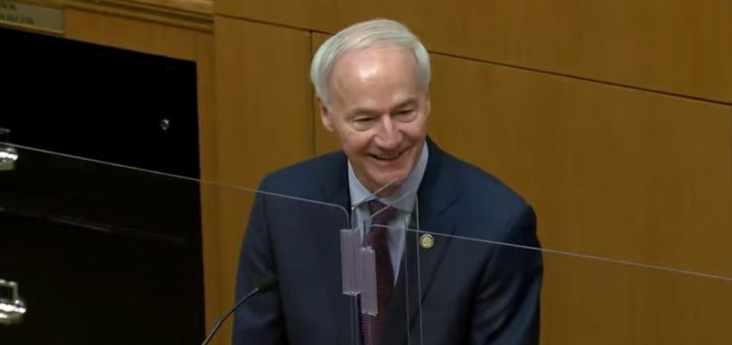Gov. Hutchinson delivers final regular session State of the State speech
by January 12, 2021 12:02 pm 802 views

Gov. Asa Hutchinson delivers his 2021 State of the State address.
Gov. Asa Hutchinson opened his final regular session address Tuesday (Jan. 12) to the 93rd General Assembly at the State Capitol in Little Rock by decrying the domestic invasion of the U.S. Capitol last week. The term-limited governor told members of the Arkansas House and Senate it was a “violent mob” that overran the nation’s Capitol and the punishments should be severe.
Hutchinson spoke as news reports have surfaced that several anti-government groups are planning armed rallies at all 50 state capitols when President-elect Joe Biden is inaugurated Jan. 20. He noted elections can be emotional events, but cannot cloud common sense judgments.
“Every person who breached the Capitol must be prosecuted to the full extent of the law,” Hutchinson said to the loudest applause of his roughly 30-minute address.
The governor pivoted from the predominant national crisis to the challenges he expects to tackle with the Arkansas legislature during the session. One topic that has been discussed at length is the governor’s emergency powers.
It’s expected that some lawmakers will try to change the governor’s emergency powers and at the very least add a layer or two of legislative oversight. Hutchinson noted the current emergency order that’s in place until Feb. 27 is meant to curb the spread of COVID-19. Some of those measures include the closure of bars and restaurants by 11 p.m., educational waivers, telemedicine expansion, and exemptions on legal liability for employers. He said he hopes the legislature will affirm these measures.
Hutchinson asked legislators to pass appropriations to allow new federal funding to be used to get COVID-19 vaccinations to the public in a more timely manner. He noted that infrastructure with the Arkansas Health Department will have to be improved to allow for a more streamlined vaccination process.
One bill expected to be controversial during the upcoming session is the Hate Crime bill. Hutchinson said he understands there has been a lot of pushback against the bill, but if one isn’t passed, Arkansas would be one of three states without such protections. Without the Hate Crime bill, the state would suffer negative economic consequences when it comes to attracting new businesses and companies to the state, he said. Some resistance to the bill is that there is a perception it’s only geared toward certain racial or ethnic groups.
“It applies equally … The time to act is now,” he said, providing an example that penalties would be enhanced if a crime was committed because of race no matter what a person’s skin color was – black, brown or white.
The governor presented a wish list to the legislature which convened Monday (Jan. 11), and will begin work this week. He wants to increase the average salary for teachers by $2,000 each year over the next two years, and he wants a reduction in the state’s used car sales tax.
His budget includes $30 million for rural broadband expansion and a push to have every student obtain a computer science credit to graduate from high school. The governor called for police departments to be fully funded and to provide better training for officers. He said steps need to be taken to increase oversight and accountability with these agencies.
Hutchinson touted changes that have occurred since he took office in 2015. The highest individual income tax rate has been reduced to 5.9%. It’s part of about $800 million that has been transferred from public to private coffers during his tenure, he said. There are 1,700 fewer state government employees, and the state enjoys a revenue surplus of more than $200 million. Hutchinson wants $100 million set aside into a long-term reserve fund.
The governor said there has been much speculation that this session might not produce any bold legislation. The national public climate has been toxic at times, and he said he hopes that doesn’t extend to Arkansas.
“How do we want history to remember this session?” he asked.
